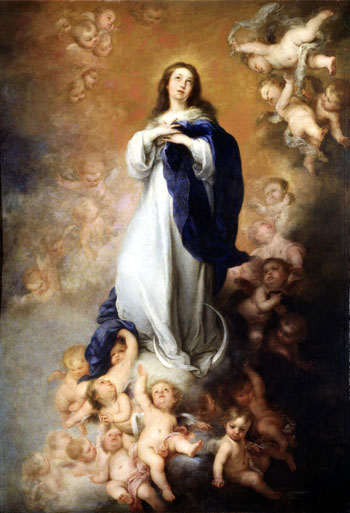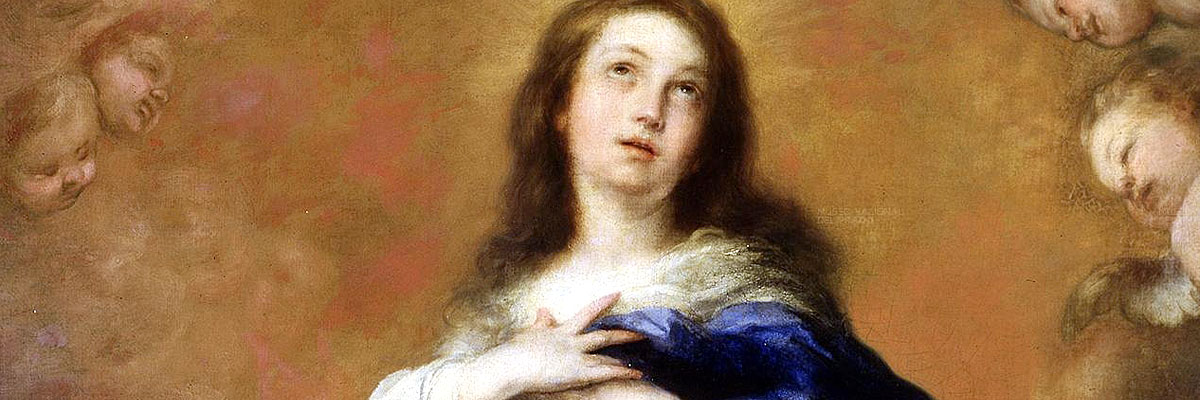Official Website of the
Catholic Diocese of Little Rock
Immaculate Conception is Dec. 9 this year
Published: December 6, 2019
The Solemnity of the Immaculate Conception of the Blessed Virgin Mary, normally celebrated on Dec. 8, will be observed on Monday, Dec. 9 this year. Since Dec. 8 falls on the Second Sunday of Advent, the feast was moved to the following day. And even though it still is a solemnity, which is the highest level of feast day in the Church, the obligation to attend Mass did not transfer with the feast.
 Simply Catholic gives a good explanation for this exception. "According to the Church’s canon law, the obligation to attend Mass is fixed to a date, not necessarily when the particular feast is liturgically celebrated. So, when Dec. 8 falls on a Sunday, the obligation to attend Mass on that date coexists with the obligation to attend Mass on Sunday. In this case, Dec. 8 is one of the Sundays of Advent, which take liturgical precedence over anything else on the liturgical calendar. Since the Church never wants to omit the liturgical celebration of the solemnity of the Immaculate Conception of the Blessed Virgin Mary, it is transferred to Dec. 9. The obligation, however, is not transferred to the temporarily given date for the celebration."
Simply Catholic gives a good explanation for this exception. "According to the Church’s canon law, the obligation to attend Mass is fixed to a date, not necessarily when the particular feast is liturgically celebrated. So, when Dec. 8 falls on a Sunday, the obligation to attend Mass on that date coexists with the obligation to attend Mass on Sunday. In this case, Dec. 8 is one of the Sundays of Advent, which take liturgical precedence over anything else on the liturgical calendar. Since the Church never wants to omit the liturgical celebration of the solemnity of the Immaculate Conception of the Blessed Virgin Mary, it is transferred to Dec. 9. The obligation, however, is not transferred to the temporarily given date for the celebration."
In the Dec. 7 issue of Arkansas Catholic, Father Jason Tyler explains why the Second Sunday of Advent takes precedence over the feast of the Immaculate Conception.
"During the season of Lent, Advent or Easter, however, the Sunday readings take precedence. It’s not that Immaculate Conception is a lesser holy day; rather, the idea is that each Sunday of Advent is significant and is needed in our preparation to celebrate the birth of Our Lord at Christmas," he explained. "With only four Sundays in the season of Advent, the Church wants to ensure that the Lord’s Day in that season is fully dedicated to preparation for the celebration of the birth of Jesus. Thus, we understand a bit more why the Sundays of Advent have a higher place on the liturgical calendar." Read the complete article.
And to complicate matters even further, it is important to understand that even though we celebrate celebrate the Immaculate Conception during Advent, the season during which we prepare for the birth of Jesus, this feast is NOT about the conception of Jesus. This can be confusing because the Gospel reading for the day focuses on the angel Gabriel appearing to Mary. "The angel said to her, 'Do not be afraid, Mary, for you have found favor with God. Behold, you will conceive in your womb and bear a son, and you shall name him Jesus.'" (Luke 1:30-31)
The Immaculate Conception refers to the conception of Mary, the mother of Jesus. The "immaculate" is not a reference to how she was conceived by her parents, Sts. Joachim and Anne. It acknowledges that God intervened and allowed her to be conceived without the stain of original sin.
So why does the Church use the announcement of Jesus' birth as the Gospel for this feast day? Before Gabriel tells Mary that she has been chosen to be the mother of Jesus, he greets her: "'Hail, full of grace! The Lord is with you.' But she was greatly troubled at what was said and pondered what sort of greeting this might be. Then the angel said to her, 'Do not be afraid, Mary, for you have found favor with God.'" (Luke 1:28-30)
The Catechism of the Catholic Church explains the significance of this greeting. "To become the mother of the Savior, Mary 'was enriched by God with gifts appropriate to such a role.' The angel Gabriel at the moment of the annunciation salutes her as 'full of grace.' In fact, in order for Mary to be able to give the free assent of her faith to the announcement of her vocation, it was necessary that she be wholly borne by God's grace." Through the centuries the Church has become ever more aware that Mary, 'full of grace' through God, was redeemed from the moment of her conception.




